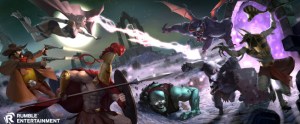GamesBeat: Once you launch, though, you’ll find at some point that a game starts tapering off. Is that the point where these other things related to user acquisition start to matter?
Richardson: Maybe. One thing you’ll see with sequels succeeding is that people have iterated on the game. They feel like they’ll get a better launch thrust with Apple or Android’s help by bringing a new product out there. Then they’re leveraging the existing audience to buttress it.
There seems to be a school of thought that says on mobile and tablet, the life cycle of players is very short. If you keep people playing your game for four or five weeks, you’re pretty successful. I think that’s really limiting. One of Nexon’s core partners is NCsoft. They’ve had their best six months in the life cycle of Lineage, which has to be more than 10 years old, in this last six months.
These great games that are built for free-to-play can last a long time, especially the ones that are more immersive. It doesn’t seem like Clash of Clans is slowing down. Lineage is a good example. Dungeon Fighter is still very successful in China. So is CrossFire. League of Legends continues to grow.
I’m not sure how to think about the life cycle of these games, other than that you should plan for them to be around forever. If you get to the point where they have diminishing returns and you’re spending more money on the marketing, you have to ask yourself – is there anything I can do to improve the product? A game like Lineage is massively different now, 10 years later. They’ve evolved and iterated against what the audience wants. They’ve become much better games.
It’s what I talked about with the restaurant analogy. You may open up and be okay with a restaurant, making enough to sustain, but if you keep iterating and working on what you’re doing, all of a sudden you can be a great restaurant. Great restaurants can last decades. But as soon as you stop moving forward, you’re probably in trouble.
In the early days of free-to-play, a lot of publishers and developers treated their games as something disposable. Build ‘em fast and cheap, milk ‘em for what you can get while they last. That’s as opposed to saying, “Hey, I’m investing in an entertainment service that could resonate with players for years.” It’s just a different mindset.
GamesBeat: Where did you find the patience to do things the way you do them?
Richardson: [laughs] I don’t think I have the patience. That’s been really hard. Part of what attracted me to starting Rumble in the first place is that we weren’t going to have as long of development cycles. Our assumptions about how long it would take us to get our games out were wrong.
The thing that’s been helpful is that you have a lot of users playing your game while you’re building it. You’re not doing it in isolation, wondering if you’ve built a gas-guzzling SUV when gas prices are about to jump. You don’t have that concern because you’re getting feedback every day from the players and finding out whether what you’re creating is exciting them.
For another thing, I’ll give you some examples from KingsRoad. When we first launched the open beta in April, we didn’t have much of an elder game. You’d play through the game to a certain level, and there was content to play, but the bulk of the game wasn’t there to compel you to continue to play. We launched something called Champion Mode, so our most veteran users now had a whole new modality of play to go after. We saw our metrics take a step function forward. The business got fundamentally healthier. We did it again with guilds, where we gave people a chance to have team-based camaraderie and competition with each other. Again, fundamental improvement in the business. When you see that kind of iteration work, it compels you to be patient. You’re finding out that by being patient, you’re making the entertainment value of what you’re creating that much better.
That’s part of what got Nexon excited. They saw the metrics from the game just going up and to the right. They’ve learned over the years that patience is critical to success. Had we lost our courage and killed KingsRoad and then gone down the path of trying to replicate a hit free-to-play game, I think we would have been of less interest to them, and in the long term we would have been less well off.
VentureBeat's mission is to be a digital town square for technical decision-makers to gain knowledge about transformative enterprise technology and transact. Learn More


